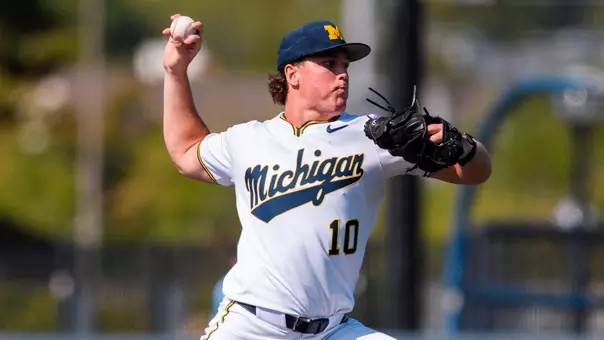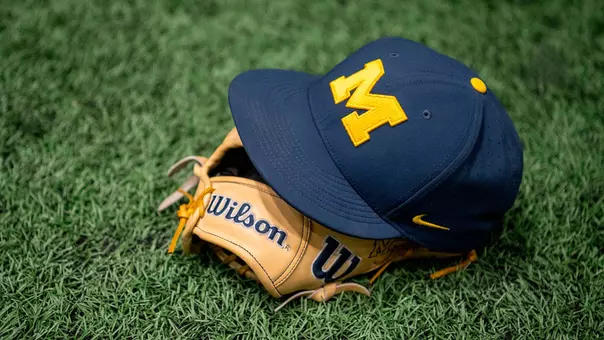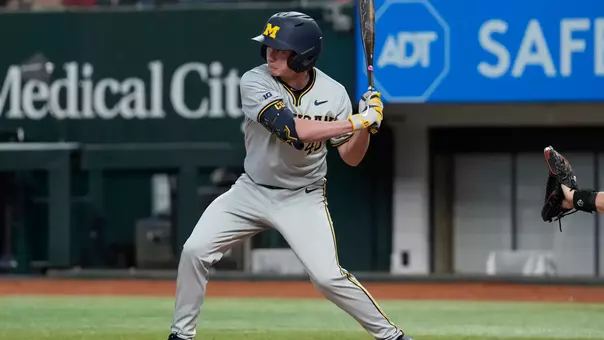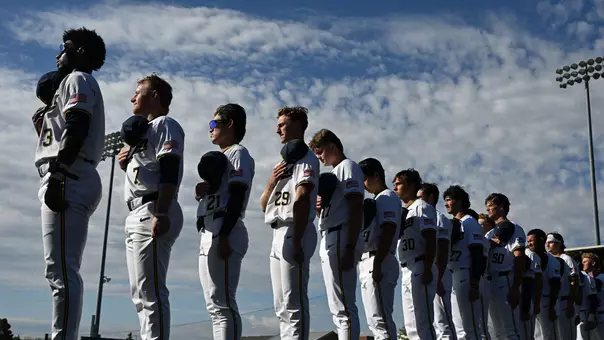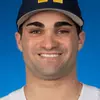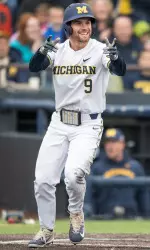
Kornacki: Persistent Brdar Worth Two Scholarships to Bakich
5/20/2017 12:00:00 AM | Baseball
May 20, 2017
By Steve Kornacki
ANN ARBOR, Mich. -- Legendary Detroit Tigers broadcaster Ernie Harwell coined the term "two for the price of one" to describe double plays.
Well, University of Michigan head baseball coach Erik Bakich describes indispensable Michael Brdar's worth in the same vernacular.
"The way he plays shortstop," said Bakich, "he's not worth one scholarship. He's worth two."
Brdar regularly turns in web gem defensive plays, as Bakich calls them, and he's also among the top 10 in the Big Ten in runs scored (43) and hits (67) while batting .307.
And as if that weren't impressive enough, Brdar has persevered through torn labrums in both shoulders and had to "re-learn" how to throw a baseball to establish himself as a top player.
"I know Coach Bakich has my back on the field and off the field," said Brdar (burr-DARR). "He's always there for me, and it's really good to hear that he would say that about me. It means a lot to me.
"He's the one who brought me in along with (assistant) Coach (Nick) Schnabel and gave me the opportunity to keep playing baseball. I didn't know if I was going to keep playing with the injuries, but I'm very thankful for the opportunities they gave me. I can never give them that much back."
Brdar continued giving his double scholarship worth Friday night (May 19), going four-for-five and tying his career high for hits while driving in two runs and scoring twice in an 11-6 win over Michigan State. The victory kept the Wolverines' chances for the conference regular-season championship alive heading into Saturday afternoon's (May 20) Big Ten finale in East Lansing.
His mother, Marianne, and brother, Nick, 17, came from Pleasanton, California, to celebrate Senior Day with him.
"Mom was the one who threw me batting practice and helped me break in my first wood bat," said Brdar. "It was important to see them because I haven't seen them in a while. It was good to see them on the field, and it was definitely special.
"It was good to pull off a win. I wanted to pull one off for them today."



Michael Brdar with brother Nick and mother Marianne
He started a double play against the Spartans but didn't have a defensive play in this game anything near his favorite play of the season that came at Fisher Stadium in late April. Indiana's Jeremy Houston hit a high hopper that got over third baseman Drew Lugbauer in the hole, and Brdar somehow turned it into an out.
"I got the ball deep in the hole," said Brdar, "and barehanded it and threw it to Joe Pace at second base for the force out. I stopped and threw it as I was falling on my back, and that was an out-of-body kind of play. I don't know how it happened."
Brdar throws the ball out of the hole like no shortstop I've ever seen. He races to his right, snags the ball, gets it out of his glove almost like a magician sleight-of-hand trick and then leans back on his back foot to fire the ball in an exaggerated overhand motion.
It's almost like loading up a catapult with rocks and slinging those to second or first base.
"He's (injured) both labrums," said Bakich. "I think he's just making the most of what his body can do. His transfer has become lightning fast because his arm might not grade out as above average. It might even grade out as below average, but his transfer is excellent. You grade out his transfer and the quickness of his hands, and it's as high as you can grade it out.
"It's almost like an (Omar) Vizquel kind of quickness. He just deflects the ball; he doesn't catch it."
Vizquel, who won 11 Gold Gloves and currently coaches with the Detroit Tigers, was the player Brdar loved watching.
"I had my right labrum operated on when I was in junior college," said Brdar, who played at Diablo Valley College in California. "I also had surgery on my left wrist. I was in a full sling and full arm cast. Then, last year, I tore the left labrum but didn't have surgery.
"So, it's been a long road, and I'm very thankful for this coaching staff giving me the opportunity. This year is the most healthy I've ever been."
Brdar said he "had a lot stronger arm in high school before the surgery" and "had to re-learn how to throw" a baseball.
"But it feels good now," Brdar said. "I just had to learn how to get rid of the ball faster."
He learned how to compensate and said his favorite drill in doing so involves sitting about eight feet from a wall and bouncing balls off it. Brdar fields countless grounders in that manner to work on that quicker transfer.
"Still before games, before playing catch, I'm bouncing the ball off walls," said Brdar. "I used to watch a lot of Omar Vizquel, my favorite baseball player. He has such quick hands. I learned a lot just watching him.
"We lived near San Francisco, and my mom had Giants season tickets, and so I watched him play late in his career when he didn't have the arm anymore."
Brdar didn't know it at the time but watching Vizquel throw and still make plays without the great velocity ended up being of great benefit.
"Absolutely," said Brdar. "I can bounce throws on one hop from deep in the hole. David Eckstein is another shortstop who could do that like Vizquel, and I watched them."

Brdar was an adequate hitter last year, batting .250, but he scored just 22 runs with 16 RBI. He's one shy of doubling that run total this season and has more than doubled the RBI total with 35.
How did Brdar -- who cut down on his strikeouts while increasing his walks -- become a more effective hitter?
"A lot of that goes to Coach Schnabel," said Brdar. "He's always there for me, and defensively, too. Throwing me batting practice, and he's taught me so much about hitting. He preaches consistency and gave me tunnel vision on what I needed to do to be the best player I can be.
"I attribute the success I'm having to him."
Brdar also graduated with a degree in economics.
"That's something that -- I don't want to say I'm most proud of -- but I'm very proud of that," he said. "It wasn't easy, and there were times I thought that maybe I should do something else. If you had told me two or three years ago that I would get a degree in economics, I would've told you that you were crazy.
"But my mom was always behind me, saying, 'Stick with it. Stick with it.'"
Sticking to it is the essence of Brdar. He had to battle his way to a Division I school from junior college, overcome substantial injuries and hit the books as he never had before.
"In 16 years of coaching," said Bakich, "he's one of the most savvy, high-basebalI IQ players that I've coached by far. He's like having another coach on the field and is going to make a tremendous coach someday. I look out to shift a player on the field, and he's already shifted them. I could see him coaching in college or getting into pro ball as a manager or roving infield instructor. He also could be a valuable front-office asset."
Brdar said his goal is to return to Michigan someday as head coach, and he uses Bakich's reserved parking spot between Fisher Stadium and Yost Ice Arena to make his point.
"I know I'm going to be in baseball for the rest of my life," said Brdar. "I love it too much -- whether it's as a Division I head coach or (in a major league) front office. That's another reason I got the economics degree.
"All summer long, I parked in Coach Bakich's parking spot. One day he stole my windshield wipers, and I said, 'One day, I'm going to take your job. Give me seven years, and I'm going to be right here in this parking spot every day.'"
Brdar sat in the dugout and chuckled. He's enjoyed every minute of the journey that's taken him across the country to become a player who gives you two for the price of one.

